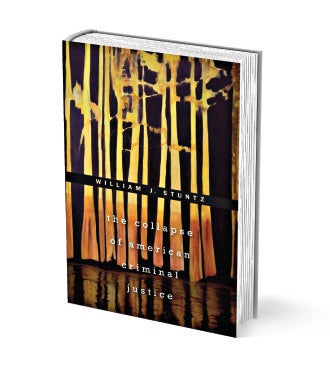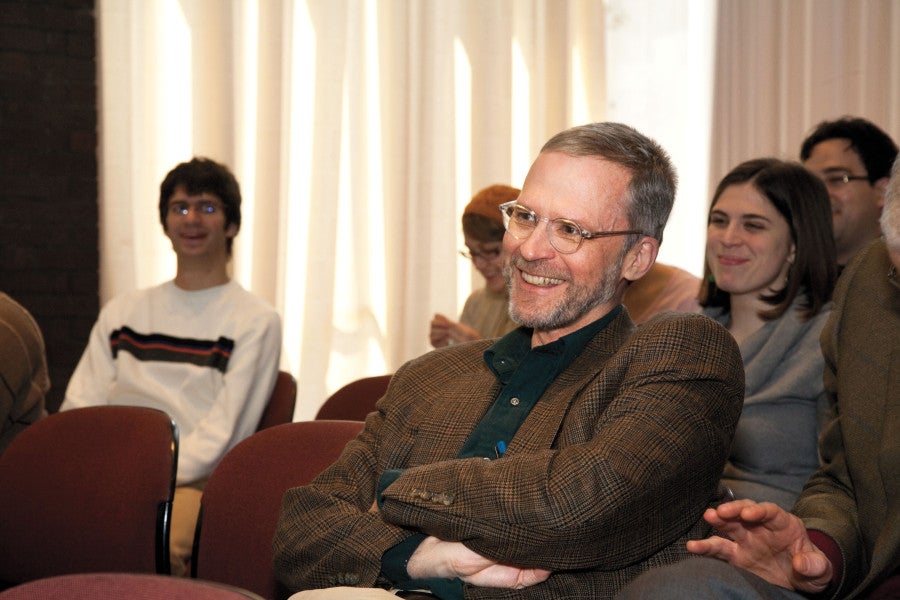Carol Steiker ’86 and Bill Stuntz had been discussing each other’s work long before they became colleagues on the HLS faculty. It began nearly 20 years ago when Stuntz, a professor at the University of Virginia School of Law and already a leading thinker about criminal justice, commented on a paper that Steiker, a young death penalty scholar and HLS professor, had presented. This dialogue intensified when Stuntz joined the HLS faculty in 2000, and continued through his final illness. Steiker says she and Stuntz were friends and professional colleagues of the first order, who didn’t always agree, but who spent a lot of time discussing each other’s ideas. Even after his death in March at age 52 of cancer, for Steiker, the dialogue continues.

In January, Stuntz completed his book “The Collapse of American Criminal Justice” and turned the manuscript in to Harvard University Press. After her friend’s death, Steiker, along with their HLS colleague Michael Klarman and Daniel Richman of Columbia Law School, shepherded the book through its final stages of production.
“It felt like a continued conversation with Bill,” says Steiker. “If an editor queried, ‘What did he mean here?’ I’d have to ask, ‘Bill, what did you mean there?’ It kept him alive for me to engage so actively and deeply with his manuscript, and to polish up a few footnotes or clarify a sentence here or there.”
Stuntz had written many highly acclaimed scholarly articles and casebooks on criminal law and procedure, but this is his only book for a general audience. In it, he argues that over the course of the late 20th century, the American criminal justice system unraveled, upending the rule of law and resulting in skyrocketing levels of incarceration, the discriminatory overrepresentation of blacks as both suspects and victims, and the rise of prosecutorial discretion, which has replaced legal doctrine and jury verdicts as the arbiter of criminal justice outcomes. Through a closely observed study of the history of crime and punishment in the United States—from bar fights, to Prohibition, to the vicious legacy of lynchings—Stuntz explores the roots of this dilemma. The solutions he proposes are “decentralization, local democracy, and last but not least—money”: Local communities should have more control over the exercise of justice in their neighborhoods. There should be more jury trials, and the juries should be composed of the defendant’s true peers. And “local governments should pay more for the prison beds they use,” creating an incentive to decrease guilty verdicts and increase investment in effective community policing. Steiker says, “He came to feel that the solutions lay less in law than in the structure of the institutions through which law is mediated; he put his greatest hope in the greater democratization of criminal justice.”

What has always been so attractive about Stuntz’s scholarship, says Steiker, is that he was an independent thinker who can’t be pigeonholed. And one of the things she loves about his last book is the way it “marries different scholarly approaches.” Stuntz, she says, was very attuned to public choice arguments that looked at the incentives of public actors in institutional settings. But he was also very drawn to history and loved to look back “and in a fine-grained way observe the past and its profound difference from the present.”
Steiker says that Stuntz was also “a very sophisticated doctrinalist,” who deeply understood the Supreme Court’s and the lower courts’ roles in developing legal doctrine and how those doctrines shaped institutions. “He brought his disparate approaches together in a unique voice, free of jargon,” she says. “In fact, he was a great storyteller.” He also crossed the “substance/procedure line.” While people in the academy often think of criminal scholars as either substantive criminal law or criminal procedure experts, she says, “Bill not only wrote about both but also showed people how they affect each other and are inextricably intertwined.”
At the center of the book—and this is a point upon which Steiker continues to imagine a debate with her friend—is a critique of the Warren Court’s emphasis on criminal procedure rather than the substance of criminal justice outcomes, resulting in the underdefended poor’s inability to benefit from rules intended to protect them. “But he eschews the traditional right-wing arguments against the ‘soft-on-crime’ Warren Court,” says Steiker. “In fact, he sort of ‘out-lefties’ the left by criticizing the Warren Court for failing poor minority defendants in particular.”
Steiker notes that despite Stuntz’s passionate yet clearsighted condemnation of the criminal justice system, which he calls “an arbitrary, punitive and discriminatory beast,” there are no ultimate villains, neither liberal nor conservative. He describes a system, she says, that is the product of limited human understanding of very complex institutions—an example of the unintended consequences he loved to point out. Ultimately, it strikes her that the book is imbued with Stuntz’s basic decency, his concern for the poor and the oppressed, and the sense that “only those who really understand the suffering that both crime and punishment entail should judge.”
“This fall, Carol Steiker received the Henry J. Friendly Professorship, which had been held by William Stuntz. In 2012, Cambridge University Press will publish “The Political Heart of Criminal Procedure: Essays on Themes of William J. Stuntz,” edited by Steiker, Michael Klarman and David Skeel.”